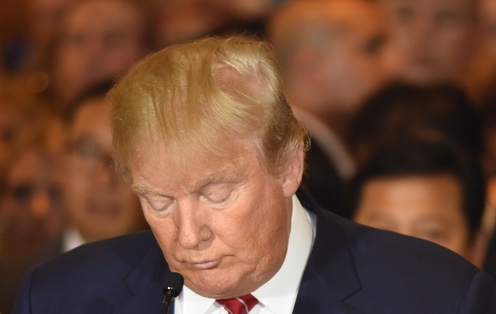Even the GOP is fleeing Donald Trump’s latest losing gambit

On Thursday, the House of Representatives voted on a bipartisan resolution to end United States military involvement in Saudi Arabia’s war in Yemen. The measure, which has already been approved by the Senate, passed by a 247 to 176 vote total, which included 16 Republicans in favor of the resolution. It sends a message of bipartisan disapproval to Donald Trump regarding his continued support of the Kingdom of Saudi Arabia in the wake of the grisly murder of American journalist Jamal Khashoggi.
Trump has already threatened to veto the resolution, which would essentially mean that he is willing to publicly defend a conflict that has been raging for years and has led to what the United Nations describes as the worst humanitarian crisis of our time. So why does Trump, who has repeatedly claimed that he opposes all endless and needless wars, not happily sign off on what his Congress has decided?
Donald Trump has already given his answer to this question quite a while ago at a press conference that occurred shortly after news of Jamal Khashoggi’s death and dismemberment in the Saudi Consulate in Istanbul had become public knowledge. After quickly getting confirmation from those around him that Khashoggi was not an American citizen, Trump pointed to the hugely profitable arms deals that were being made with his personal ally Saudi Arabia. Trump emphasized (and wildly exaggerated) the number of American jobs that would result from the deals, thus essentially pitting the value of one single human life against the prospect of increased economic prosperity of the entire country.
Whether the economic gains attached to the U.S.—Saudi arms deals would indeed benefit American workers in a significant way remains an open question. It is quite obvious, however, that arms manufacturers like Lockheed Martin and Raytheon have already made massive profits equipping the Saudi-led coalition with whatever it needs to wage war in Yemen. According to an article by Frank Andrews that appeared in The Middle East Eye on April 4, the arms trade watchdog Security Assistance Monitor (SAM) uncovered that American-made military equipment is already ubiquitous in Yemen and that the profits made by American arms manufacturers may be significantly higher than what is publicly known, because – in contrast to governmental arms deals – commercial deals are not being tracked officially and do not show up in the public record.
It doesn’t really come as a surprise that Donald Trump, who has repeatedly attacked the media as “the opposition party” and the “enemy of the people,” did not choose to risk immensely profitable deals in order to come out as the champion of a dissident journalist. However, Trump does not have the full, unanimous support of his own party on the stance he has taken of unequivocally putting money above morals. Congressional Republicans are reportedly unhappy about Trump’s refusal to comply with demands for a human rights investigation and the president’s failure to accept findings of intelligence agencies which strongly suggest that Saudi Crown Prince Mohammad bin Salman ordered the murder of Jamal Khashoggi. It will be interesting to see how much of a wedge this issue is going to drive between Donald Trump, who is already rather precariously balanced, and the party he needs to prop him up so that he can stay in power.

